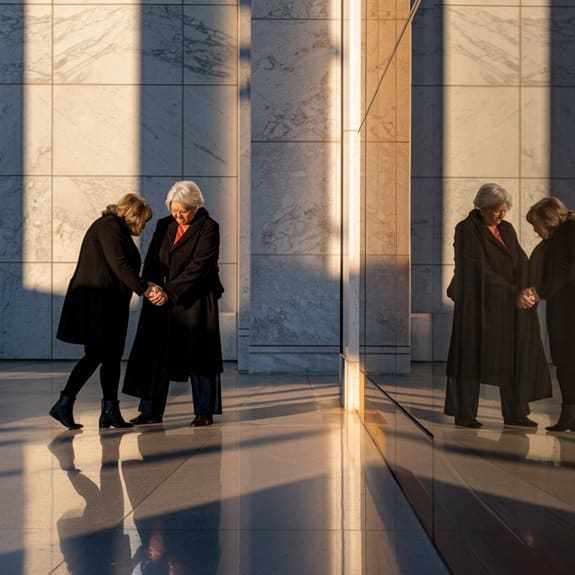
The Hill v. Dhanda case redefined BC’s legal understanding of “spouse” by recognizing marriage-like relationships through practical evidence rather than formal marriage. You will find that courts now evaluate factors like cohabitation, shared finances, and mutual commitment when determining spousal status. The ruling established that couples who have lived together for at least two years, while demonstrating financial interdependence and shared responsibilities, can qualify for spousal rights under BC law. This landmark case opens new perspectives on modern relationship recognition.
The Hill V. Dhanda Case: a Legal Milestone
While the Hill v. Dhanda case may seem like just another legal dispute, it is actually redefined how British Columbia courts view marriage-like relationships.
The case centred on Tiena Hill’s claim to be recognized as Mike Dhanda’s spouse after his death in June 2022, despite never formally marrying him.
A landmark case challenging traditional marriage definitions when Hill sought spousal recognition following Dhanda’s death without formal matrimony.
You will find the case particularly significant because it established clear guidelines for determining spousal status under the Wills, Estates and Succession Act.
The court examined multiple factors, including the couple’s cohabitation from September 2015 until Mike’s death, their shared financial responsibilities, and Tiena’s involvement with Mike’s children from a previous marriage.
The ruling ultimately favoured Hill, granting her status as Mike’s spouse and entitling her to inherit a portion of his estate alongside his two sons.
Modern Relationships and BC Law
As society evolves, British Columbia’s legal framework has adapted to reflect the diverse nature of modern relationships. The Hill v. Dhanda case demonstrates how courts now look beyond traditional marriage certificates to recognize marriage-like partnerships.
You will find that BC law considers multiple factors when determining spousal status, including shared living arrangements, financial interdependence, and mutual commitment to family life.
The law does not require you to be legally married to be considered a spouse. Instead, it examines whether you have lived together in a marriage-like relationship for at least two years.
This modern interpretation acknowledges that today’s relationships often do not follow conventional patterns. Your relationship’s substance matters more than its form, with courts considering practical aspects like shared responsibilities, financial arrangements, and social interactions.
Key Factors in Determining Marriage-Like Status
Several key factors determine whether your relationship qualifies as marriage-like under British Columbia law, based on the precedent set in Hill v. Dhanda.
You will need to demonstrate consistent cohabitation, typically sharing the same residence for at least two years. The court also examines your financial interdependence, including shared expenses and mutual support.
Your public presentation as a couple matters too, such as attending social events together and maintaining joint responsibilities.
How couples present themselves publicly, including shared social activities and responsibilities, plays a vital role in proving marriage-like status.
The way you handle domestic duties, care for children, and support each other emotionally all contribute to proving a marriage-like relationship.
While tax documents and formal declarations can provide evidence, they are not decisive on their own. Instead, the court takes a thorough view of your relationship’s nature and commitment level.
Financial Interdependence and Shared Living
Living under the same roof represents just one aspect of a marriage-like relationship in British Columbia – you will also need to show meaningful financial ties.
In the Hill v. Dhanda case, the court examined how Tiena and Mike shared household expenses, maintained joint responsibilities, and supported each other financially throughout their relationship.
You will find that courts look closely at whether couples pool their resources, share costs, or maintain joint accounts.
They will consider if you are helping with mortgage payments, utilities, or daily expenses.
The degree of financial integration does not need to be complete, but there should be evidence of mutual support and shared financial responsibilities.
This interconnected financial relationship helps demonstrate the marriage-like nature of your partnership under BC law.
Impact on Estate Distribution Rights
The legal recognition of a marriage-like relationship directly shapes how property and assets will be distributed after death.
Marriage-like status has profound implications for estate distribution, determining who inherits what when a partner passes away.
As demonstrated in the Hill v. Dhanda case, when you are recognized as a spouse under WESA, you will gain significant inheritance rights to your partner’s estate, even if there is no will in place.
You will need to prove that you have lived in a marriage-like relationship for at least two years before your partner’s death to qualify for these rights.
The court will examine multiple factors, including shared finances, living arrangements, and your role in family life.
If successful, you will be entitled to a portion of the estate alongside any biological children, as Tiena Hill’s case showed when she received her share while Mike’s sons inherited the remainder.
Evidence Beyond Legal Documents
Courts look beyond formal paperwork when determining if a relationship qualifies as marriage-like, considering day-to-day behaviours and interactions that paint a fuller picture.
In the Hill v. Dhanda case, the court examined evidence like shared living arrangements, financial support patterns, and involvement in raising Mike’s children.
You will find that practical indicators carry significant weight in these determinations. These include whether the couple shared meals regularly, attended social events together, and how they presented themselves to family and friends.
The court also considered how Tiena and Mike managed household responsibilities and participated in each other’s family lives.
While tax returns showed them as “single,” their actual living arrangement and behaviour demonstrated a deeper commitment that aligned with a marriage-like relationship.
Future Implications for Family Law
Significant precedents set by Hill v. Dhanda will likely shape how BC courts evaluate marriage-like relationships in the future.
You will see courts taking a more holistic approach, considering both objective evidence and subjective intentions when determining spousal status. This case reinforces that traditional markers, like tax filing status, are not the only factors that matter.
You can expect courts to examine relationships through a modern lens, acknowledging that today’s families often do not fit conventional moulds.
The ruling suggests that financial interdependence, shared living arrangements, and involvement in each other’s lives – including relationships with children – will carry significant weight.
This broader interpretation of marriage-like relationships may impact estate planning, family law proceedings, and how legal professionals advise their clients on relationship rights and obligations.
Conclusion
You will find that Hill v. Dhanda represents a significant shift in how BC courts view modern relationships. The case demonstrates that determining spouse status is not just about checking traditional boxes – it is about understanding the complexity of contemporary partnerships. Whether you are in a common-law relationship or considering one, this ruling affects your rights and how courts will interpret your relationship status in future legal matters.

We serve the entire province of BC. Our experienced paralegals can meet with you in Vancouver and throughout the Lower Mainland, making it easier for you to get the assistance that you need. We also have an interior office in Kamloops. That said, our lawyers have the infrastructure to work with any of our clients virtually — even in the furthest regions of British Columbia.
Call (604) 256-7152 [toll free 1 (877) 415-1484] to get routed to the best representative to serve you or contact us online to schedule an appointment.
We also have a dedicated intake form to help you get the ball rolling. Our intake team will review your specific case and advise you on the next steps to take and what to expect moving forward.
Our offices are generally open 8:30 a.m.—5:00 p.m., Mon—Fri.
Vest Estate Law is dedicated to providing you with practical and innovative advice in estate administration, estate planning, and estate disputes, do not hesitate to reach out and one of our knowledgeable staff will respond promptly to arrange a consultation that meets your needs.


Kelly Sullivan
WILLS and ESTATES PARALEGAL
Kelly is a highly accomplished Paralegal with an impressive 28-year tenure in the legal industry, specializing in estate administration and estate planning at Vest Estate Law.

